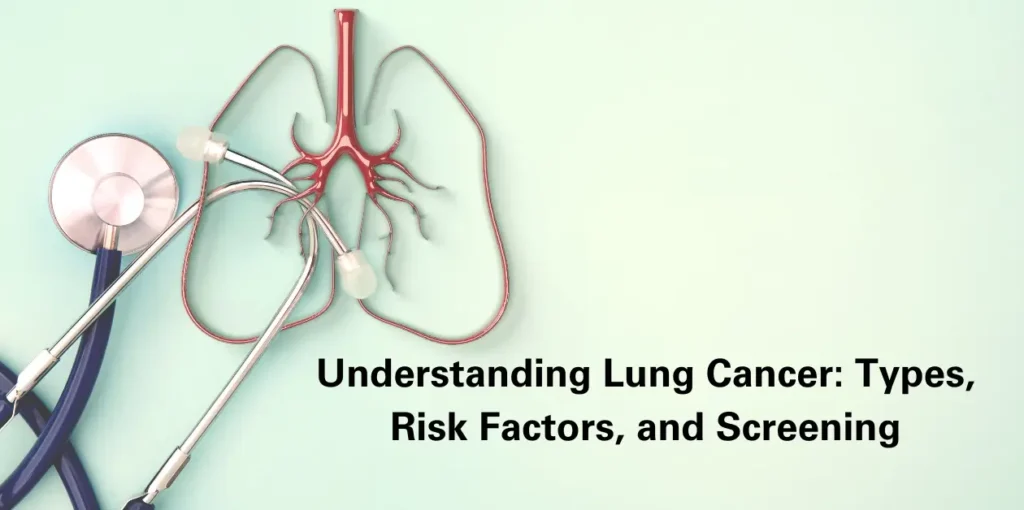Understanding Lung Cancer: Types, Risk Factors, and Screening

Lung cancer is a major health concern worldwide, characterized by uncontrolled growth of abnormal cells in the lungs. This blog will provide a comprehensive overview of lung cancer, including its types, prevalence, causes, initial stage, screening tests, target audience for screening, and common symptoms.
Types of Lung Cancer
Lung cancer is categorized into two primary types:
- Non-Small Cell Lung Cancer (NSCLC)
- Adenocarcinoma: The most common form of NSCLC, often found in the outer parts of the lungs and more common in non-smokers.
- Squamous Cell Carcinoma: Typically occurs in the central part of the lungs and is strongly associated with smoking.
- Large Cell Carcinoma: A less common type that can appear in any part of the lung and tends to grow and spread rapidly.
- Small Cell Lung Cancer (SCLC)
- Characterized by its rapid growth and tendency to spread quickly to other parts of the body. It is less common than NSCLC but more aggressive.
How Common Is Lung Cancer?
Lung cancer is one of the most prevalent cancers globally. According to the American Cancer Society, it ranks as the second most common cancer in both men and women, following skin cancer. It is also the leading cause of cancer-related deaths, emphasizing the need for effective prevention and early detection strategies.
Causes of Lung Cancer
Several factors increase the risk of developing lung cancer:
- Smoking: The leading cause of lung cancer, responsible for a significant majority of cases. Both active smoking and exposure to secondhand smoke are major risk factors.
- Radon Exposure: A naturally occurring gas that can accumulate in homes, radon is a known carcinogen linked to lung cancer.
- Asbestos Exposure: Historically used in construction, asbestos fibers, when inhaled, can cause lung cancer.
- Family History: Genetic factors play a role, particularly if close relatives have had lung cancer.
- Air Pollution: Long-term exposure to air pollutants and toxic chemicals can contribute to lung cancer risk.
The First Phase of Lung Cancer
In the early stages, lung cancer may not present noticeable symptoms. The initial phases include:
- Stage 0: Also known as carcinoma in situ, where cancer cells are present but have not invaded surrounding tissues.
- Stage I: The cancer is localized within the lung and has not spread to lymph nodes or other parts of the body. This stage generally has a better prognosis with early treatment.
Screening Tests for Lung Cancer
Early detection is critical for improving treatment outcomes. The primary screening test for lung cancer is:
- Low-Dose Computed Tomography (LDCT): This imaging technique uses X-rays to create detailed pictures of the lungs, allowing for earlier detection of lung cancer compared to traditional chest X-rays.
Who Should Get Screened?
Screening is recommended for individuals at higher risk, including:
- Current or Former Smokers: Especially those aged 50 to 80 with a history of heavy smoking.
- Individuals with a Family History of Lung Cancer: Genetic predisposition may warrant early screening.
- People with Significant Exposure to Carcinogens: Those exposed to radon or asbestos should consider screening.
Symptoms of Lung Cancer
Early-stage lung cancer often lacks symptoms, but as the disease progresses, symptoms may include:
- Persistent Cough: A chronic cough that does not go away or worsens.
- Chest Pain: Ongoing pain or discomfort in the chest area.
- Shortness of Breath: Difficulty breathing or unexplained breathlessness.
- Weight Loss: Unintentional weight loss or loss of appetite.
- Coughing Up Blood: Presence of blood or rust-colored sputum.
Conclusion
Understanding the types, risk factors, and symptoms of lung cancer is crucial for early detection and treatment. If you or someone you know is at risk, consider discussing screening options with a healthcare provider. Early intervention can significantly impact the effectiveness of treatment and overall prognosis.
Take Action Today! If you’re at risk or experiencing symptoms, don’t wait—schedule a screening with Our Experts. For more information on lung cancer and screening options, contact us or visit our website for resources and support.

Dr. A. Venugopal
Clinical Director & HOD Medical Oncology Senior Consultant Medical Oncologist & Hemato-Oncologist
About Author
Dr. A. Venugopal
MD (General Medicine), DM (Medical Oncology), MRCP – SCE Medical Oncology (UK), ECMO (Switzerland).
Dr A. Venugopal is One of the best medical oncologist and Hemato Oncologist in hyderabad, currently serving as the Head of the Department and Senior Medical Oncologist, Hemato Oncologist at Pi Health Cancer Hospital in Gachibowli, Hyderabad. He brings over 15 years of extensive experience in the field of Oncology.
